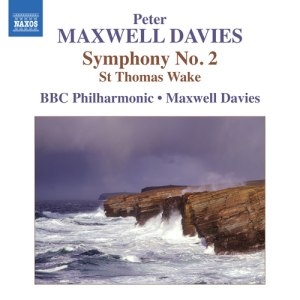 |
 |
|


alternatively
CD: MDT
AmazonUK
AmazonUS
Sound
Samples & Downloads |
Peter MAXWELL DAVIES
(b. 1934)
Symphony No. 2 (1980) [56:02]
St Thomas Wake (1969) [20:38]
 BBC Philharmonic/Peter Maxwell Davies
BBC Philharmonic/Peter Maxwell Davies
rec. September 1993, Studio 7, New Broadcasting House, Manchester,
UK (symphony) and live 12/13 July 1991, Town Hall, Cheltenham, UK
 NAXOS 8.572349 [76:40]
NAXOS 8.572349 [76:40]
|
|
|
I was present at the premiere of Peter Maxwell Davies’s
First Symphony in London in 1978, and remember that my reaction
to it was a surprising mixture of excitement and something close
to disappointment. Prior to that evening the only music I knew
by the composer was Eight Songs for a Mad King and Miss
Donnithorne’s Maggot, both learned from Unicorn LPs
and revered by me as radical, challenging stuff. Now here was
the same composer essaying a much more traditional form, citing
Schumann, of all people, as a source of study, and Sibelius
as a major influence. Yet the work itself was gripping, holding
my attention throughout despite a timing of getting on for an
hour.
Since then I’ve found many of Maxwell Davies’s large-scale
works rather grey and forbidding. I certainly felt this about
the Third Symphony: the BBC Artium disc sits on my shelves,
and I’m only too aware how much time has passed since
it was last played. The Violin Concerto, in a superb performance
by Isaac Stern, likewise. I even find it difficult to get heated
about the remarkable series of string quartets instigated by
Naxos.
When this performance of the Second Symphony was first released
on the Collins label in 1994 the work was hailed in the Gramophone
as a masterpiece. I didn’t hear it then, and come new
to it now. Although I would hesitate before using the word “masterpiece”
it is a very fine work indeed. Like its predecessor, it is written
on a large scale, and in spite of the difficulty of perceiving
its themes it does hold the listener’s attention, even
at a first hearing. The inspiration for the work is the sea,
and in particular - Maxwell Davies writes in the booklet note
- the tensions set up by the confluence of the Atlantic Ocean
and the North Sea “at the foot of the cliff before my
window”. He goes on to describe at length his observations
of wave forms and explains how he has sought to incorporate
these into his symphony. He tells us, too, that part of the
thematic material is derived from a Marian plainsong; curiously,
the symphony “is a birthday gift for the Virgin.”
It’s obviously prestigious to have the insert notes written
by the composer, but if CD booklet notes are meant to constitute
an aid to listening, which they surely should in the case of
a new and difficult work, then these, at once technical and
obscure in the extreme, are a dismal failure.
Stephen Pruslin’s note on St Thomas Wake, on the
other hand, is very nearly a model of its kind, providing background
information, explanation and description in straightforward
language. The work itself is vintage Maxwell Davies, with a
period band - dressed in boaters and striped blazers - sitting
beside the symphony orchestra, its series of superbly adept
pastiche foxtrots on which the orchestra comments and eventually
overwhelms, and the whole a kind of ironic evocation of the
composer’s childhood memories of the Second World War,
plus much else besides. Though frequently comic, it is, in fact,
a deeply serious work, heavily disguised.
The performance of the symphony by the BBC Philharmonic under
the composer’s direction is a fine one. The work was written
for the Boston Symphony Orchestra, whose violins might have
been marginally more brilliant than these. One wonders how many
times the Boston orchestra has given this work since its premiere
in 1980. The live performance of St Thomas Wake, from
the Cheltenham Festival, is sensational. The sound is very good
in both works, though again, the violins seem weak in the symphony
and could have been given a little more prominence.
Naxos, with their enormous catalogue of original recordings,
are also putting us in their debt by reissuing performances
such as these that have not seen the light of day for some time,
often from defunct labels. In this case we have a deeply serious,
big, four-movement symphony that does not give much away on
a first hearing but enormously repays repeated listening and
detailed study. It is coupled with a much more immediately attractive,
shorter work that conceals its serious nature behind a frequently
hilarious façade. Masterpieces? I don’t know, but
I think the latter comes slightly closer than the former.
William Hedley
Reviews
of other Maxwell Davies recordings on Naxos
|
|




 All Nimbus reviews
All Nimbus reviews








